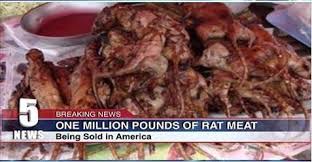Rat meat is a popular food source in many countries around the world. It is especially common in China and India, but a small number of people also consume it in Australia and some parts of Europe.
However, if you’re thinking about eating rat meat, it’s important to know a few things about the animal itself.
Overview of Rat Meat as a Food Source
Rat meat is an important source of protein for people in many parts of the world. It is used to make a variety of dishes and can be served as a delicacy in restaurants.
In Asia, rat is a common delicacy and is enjoyed by both locals and foreigners alike. It is also used as a source of bait for fishing.
Rats are also a common food in many African countries. However, the African cane rat has been found to carry salmonella, so it is vital that rat meat is cooked thoroughly before eating.
Culinary Uses and Traditional Dishes
Rat meat is an excellent source of protein and is commonly used by a variety of cultures. It is often grilled or barbecued, fried, or stewed, and can be blended with other meats in a number of dishes.
In tropical regions, it is a common addition to stews and soups. It is also cooked in a pot over a fire, or grilled with special spices.
Several traditional dishes feature rat meat, including rat curry and West Virginian rat stew. The latter is a dish of cleaned and skinned rats that are simmered with onions, garlic, and local vegetables.
The taste of rat meat is similar to that of other gamey meats, such as rabbit or guinea pig. It is not as sweet, however. Depending on how it is prepared, it can range from mild to very gamy.
Availability and Market Trends
In many countries and regions around the world, rats are a regular part of peoples’ diets. They are often consumed as a savory treat and even as a regular source of protein.
Rats are also farmed in West Africa to increase the availability of meat and improve the livelihoods of farmers. They are a good alternative to wild-caught rats and are relatively easy to domesticate.
The African giant rat (Rattus rattus Linnaeus) is an important food animal in many countries, including Nigeria. It is caught in a variety of ways and consumed either in roasted, cooked or smoked form.
Health Benefits and Concerns
Rat meat is considered a delicacy in some cultures, but it can carry diseases and bacteria. It also contains high amounts of mercury, so it’s best to consume it in moderation.
However, there are some health benefits associated with eating rat meat. It’s an excellent source of protein and is nutritious.
It is also easy to prepare and can be added to many dishes. It can be roasted, barbecued or blended with other meats for a delicious meal.
Rat meat is also a good source of vitamin C, which can help protect against various diseases and prevent the growth of cancer cells. It is also low in calories and is a good addition to any diet.
Sustainability Issues
Rats are a key source of protein in some regions of the world, including Africa and Southeast Asia. But this practice has been linked to significant environmental and human health concerns.
One of the main sustainability issues surrounding rat meat is that it’s often harvested from wild-caught animals, which can pose serious health risks for humans. This is especially true in areas where the COVID-19 virus is widespread, such as Vietnam and Cambodia.
Alternatively, rats could be farmed, which is not only sustainable but also helps to reduce greenhouse gas emissions and sequester carbon in the soil. Pasture-based livestock systems, which incorporate grazing techniques such as rotational grazing and cover cropping, more than offset the ruminants’ GHG emissions. These methods can help to mitigate climate change and also provide a biochemically-rich diet (Teague et al., 2016).

